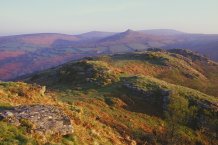articles

Restoring landscapes, like this one in Dartmoor, and improving them for people and wildlife will be a focus for the new partnership. Credit: Paul Glendell, Natural England
Natural England and University of Exeter announce partnership
Natural England and the University of Exeter have announced a new strategic partnership to boost nature recovery.
Signing the three-year agreement today, they also aim to advance research and innovation; share knowledge; enable staff, partners and students to maximise their potential; and help to ensure the sustainable stewardship of land and sea.
The organisations have worked on more than 60 joint research projects over the last decade – and exciting new projects are already under way.
These include the £10 million RENEW project, which will investigate and tackle biodiversity loss through a “people in nature” approach, working with landowners, businesses and communities to restore woodlands, wetlands and farmland.
"This is the critical decade in which we must tackle the environment and climate emergency," said Professor Lisa Roberts, Vice Chancellor of the University of Exeter.
"We are committed to partnerships with governments, businesses and communities, and we are delighted to be working with Natural England towards our shared goals.
"The University of Exeter has brought together more than 1,400 researchers working on the environment and climate, and through this partnership we will use our research power to protect nature and landscapes and work towards a thriving future for human societies and the natural world."
Dr Tim Hill, Natural England's Chief Scientist, said: "Natural England is delighted to be embarking on this Strategic Partnership with the University of Exeter, building on years of close working on a wide range of projects.
"Our vision is ‘Thriving Nature for people and planet’ and we aim to achieve this through our mission ‘Building partnerships for Nature’s recovery’.
"Closer working with the University of Exeter, as one of the world’s centres for nature conservation research, will significantly further our aims of moving from being an evidence-based organisation to being an evidence-led organisation, as signalled in our Science, Evidence and Evaluation Strategy."
Recognising the complex interplay between nature, the economy and society, the partnership will focus on addressing challenges that can’t be solved with expertise from practitioners or academics alone. These issues require co-created solutions, informed by both theory and practice.
The partnership activities will focus on two critical themes to deliver transformative change: understanding environmental change and understanding what works for nature’s recovery.
Date: 10 October 2022
